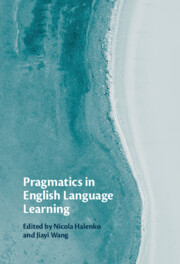Book contents
- Pragmatics in English Language Learning
- Pragmatics in English Language Learning
- Copyright page
- Contents
- Figures
- Tables
- Contributors
- Foreword
- Acknowledgements
- Introduction
- 1 Second Language Pragmatics
- Part I Pragmatics in Action
- Part II Instructed Pragmatics
- 6 Interlanguage Pragmatic Development in a German EFL Secondary School Context
- 7 ‘Learning to Say “No” in Different Ways’
- 8 Using Self-Access Materials to Learn Pragmatics in the US Academic Setting
- Conclusion
- Index
- References
6 - Interlanguage Pragmatic Development in a German EFL Secondary School Context
Investigating Input and Output Focussing on the Speech Acts of Agreement and Disagreement
from Part II - Instructed Pragmatics
Published online by Cambridge University Press: 29 September 2022
- Pragmatics in English Language Learning
- Pragmatics in English Language Learning
- Copyright page
- Contents
- Figures
- Tables
- Contributors
- Foreword
- Acknowledgements
- Introduction
- 1 Second Language Pragmatics
- Part I Pragmatics in Action
- Part II Instructed Pragmatics
- 6 Interlanguage Pragmatic Development in a German EFL Secondary School Context
- 7 ‘Learning to Say “No” in Different Ways’
- 8 Using Self-Access Materials to Learn Pragmatics in the US Academic Setting
- Conclusion
- Index
- References
Summary
This study examines English as a foreign language (EFL) learners’ pragmatic input and output regarding agreements and disagreements. The investigation of the EFL input materials focuses on the Lighthouse series and examines six textbooks and their accompanying audio materials for years one to six (corresponding to grades 5-10) at German intermediate secondary school. The investigation of pragmatic output presents the results of a cross-sectional developmental study conducted at a German intermediate secondary school involving two year groups - year 8 and year 10 – consisting of twenty-eight and thirty-one EFL learners respectively. The output data were elicited with an illustrated discourse completion task. The results of the input investigation revealed that L2 learners working with the textbook and audio CDs over a six-year period would have encountered a nearly even number of agreements and disagreements by the end of their studies but that the distribution across the two material types differed from year to year and also for the two speech acts. While the output data showed no considerable differences in the groups’ use of agreement strategies, differences were observed with regard to their employment of disagreement strategies and negative pragmatic transfer from learners’ L1.
- Type
- Chapter
- Information
- Pragmatics in English Language Learning , pp. 143 - 172Publisher: Cambridge University PressPrint publication year: 2022



